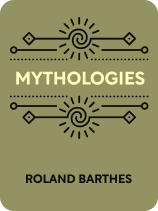

This article is an excerpt from the Shortform book guide to "Mythologies" by Roland Barthes. Shortform has the world's best summaries and analyses of books you should be reading.
Like this article? Sign up for a free trial here.
What images, objects, and stories have you seen or heard today? What’s the real message of each meme, advertisement, and headline?
In Mythologies, 20th-century French philosopher Roland Barthes says that all of these contain subtle messages that subconsciously shape the way you view the world. He calls these messages myths.
Keep reading for a few Roland Barthes quotes from his essays in Mythologies, along with some context and explanation.
Roland Barthes Quotes From Mythologies
These five Roland Barthes quotes from his essays in Mythologies will give you a taste of the ideas he puts forward for consideration.
“The cultural work done in the past by gods and epic sagas is now done by laundry-detergent commercials and comic-strip characters.”
Barthes suggests that institutions in society (for example, the government, the fashion and advertising industries, and the media) create associations between certain signs and concepts, and the general population internalizes these associations and comes to see them as natural. For example, a Jeep is associated with outdoor adventure—this association is conveyed in all Jeep advertisements, and therefore a Jeep will appeal to people who think of themselves as outdoor adventure types.
“However paradoxical it may seem, myth hides nothing: its function is to distort, not to make disappear.”
Barthes suggests also that myth doesn’t just add new meaning to the raw material—it also distorts the original meaning. As an example, consider a fictional political candidate. At rallies, she always plays a specific song as she walks onto the stage to get the crowd excited. Over time, voters begin to associate the song with the candidate: her supporters play it at marches and her opponents stop listening to it. The song comes to represent the candidate’s particular brand of politics. When the candidate pairs the song with these abstract concepts, the song becomes the material for a myth. It is no longer just a song, but also a political message.
The song itself has a set of meanings, including the meaning of the words and the melody, the history of the artist, and the historical context. These original meanings help create the myth. For example, perhaps the song already had particular undertones that make it an ideal choice for this candidate’s campaign.
“Photography is an ellipse of language and a condensation of an ‘ineffable’ society.”
In Barthes’s essay “Bichon Among the Blacks,” he describes a story from a French magazine called Match about a young white couple who visited Africa with their toddler son, Bichon. The featured photo of the article shows the blonde toddler with three dark-skinned African tribespeople.
The myth presented here is a narrative about race, with the white couple being presented as heroic in their willingness to be among the “savage” Africans. On the surface, the article tells the heartwarming story of racial groups mingling peacefully. But, Barthes argues, it conceals the deeper message of racial difference, promoting an insidious myth of white supremacy.
“French toys are … meant to produce children who are users, not creators.”
Barthes specifically aims to critique the class constructs that underlie the myth in his own culture (1950s France). He says myth is like a mask that presents a falsehood and shields people from harsh realities, which serves to sustain the social order and reinforce class distinctions. As examples of this, he points to examples of the way children’s toys are geared toward conformity to a world of work and social expectation, rather than toward creativity. He describes such toys as hammers and trucks for boys and dolls and tea sets for girls, to show that children are socialized into the roles they’ll be expected to play in society. He says that very few toys actually encourage free thought and creative expression.
“There are thus very engaging myths which are however not innocent.”
Barthes suggests that a defining characteristic of myth is its ability to appear as “natural” even though it is constructed. This means that people don’t question the myth and instead accept it as fact. When society’s dominant institutions utilize mythology to influence the population’s thoughts, this can serve to perpetuate and reinforce social inequalities. In this way, by not questioning the mythology around us, we participate in our own subjugation.
Barthes points out that, when myth disguises the “dirt” of more serious issues like racism, sexism, or fascism, then we enter into dangerous territory, where people can come to accept these as natural and normal and fail to challenge them.

———End of Preview———
Like what you just read? Read the rest of the world's best book summary and analysis of Roland Barthes's "Mythologies" at Shortform.
Here's what you'll find in our full Mythologies summary:
- The subtle messages that subconsciously shape the way we view the world
- How myths are used to reinforce cultural norms and values
- Why myths can pose dangers to society






